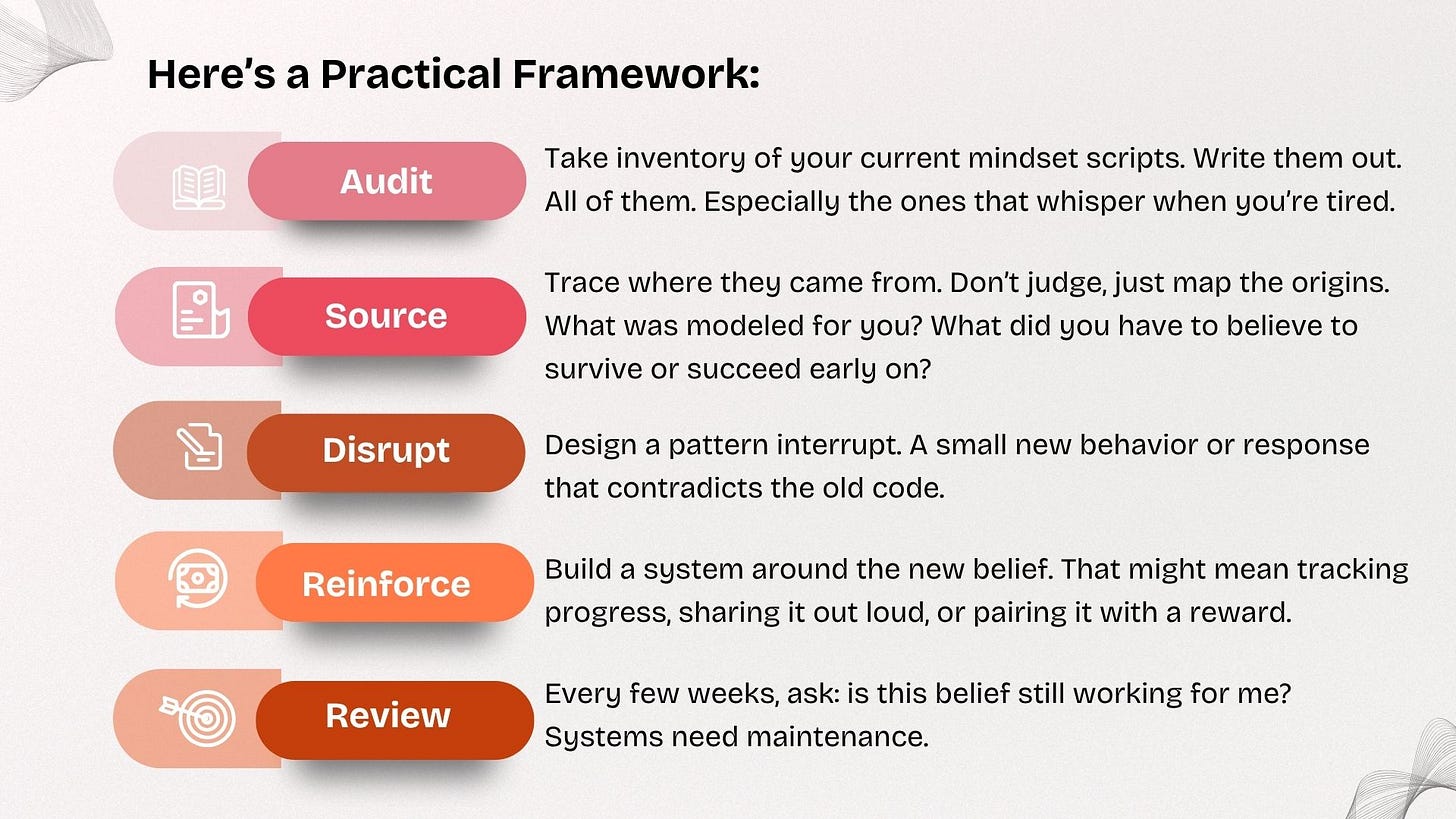Still Running That 1997 Mental Software?
Mindset Is a System....Upgrade Your Internal Operating Code
You don't "have" a mindset. You're running one. Like software.
The question is: who wrote it?
Was it your third-grade teacher who said you weren't creative? Your parents’ financial fear dressed up as "being realistic"? That first boss who ran on control and coffee, and expected you to do the same?
Most of us are operating on code we didn't write. Scripts installed when we were too young, too impressionable, or too eager to please. They're running in the background, shaping how we react to stress, success, failure. Telling us what we can and can’t do. How we should act. What we deserve.
The kicker? We rarely pause to read the code. Let alone question it.
Until you make the unconscious conscious, it will direct your life and you will call it fate. — Carl Jung
But your mindset is code. A logic system. Shaped by beliefs, reinforced by habits, occasionally hijacked by fear. And like any system, it can be upgraded. Not with willpower alone. Systems don’t respond well to brute force. You can’t bully your brain into evolving. But you can feed it better inputs.
Here’s The Reframe:
Your thoughts are not gospel. They’re more like default settings. Just because you’ve thought a thing 10,000 times doesn’t mean it’s true. Just means it’s familiar.
So instead of “fixing your mindset” like it's broken, start treating it like a living system. Responsive. Programmable. Capable of learning.
Try this:
Identify one belief that’s not helping. Maybe it's "I'm not a morning person." Or "I always screw this part up." Or "I’m just not good at public speaking."
Ask: where did this come from? Can you trace it back to a moment, a person, a pattern?
Test a new belief. Think of it like installing a beta version. You’re not lying to yourself. You’re trying out a more helpful script.
For example, replace “I always procrastinate” with “I’m learning to finish early.” You’re not gaslighting yourself. You’re just sending a new signal.
The brain loves patterns. But it’s also plastic, literally. Neuroplasticity means your brain rewires based on what you do and think repeatedly. It’s not instant. But it’s real.
This is Where Systems Thinking Matters.
Don’t look for a mindset hack. Build a feedback loop. Create small, sustainable actions that reinforce the new belief. Maybe it’s setting a 20-minute timer and writing the first paragraph. Maybe it’s texting someone when you finish a task. Maybe it’s just noticing the old thought and not reacting to it.
These are not “tiny habits.” These are system upgrades. Inputs that change the output.
Over time, the system adapts. You start to believe the new code. Not because you shouted affirmations in the mirror, but because the data changed. You showed up differently. The inputs shifted. The outputs followed.
Mindset is not about being perpetually positive. It’s about being adaptive. Self-aware. Willing to iterate.
The old code may still whisper. But it doesn't have to run the show.
Let’s Go Deeper.
Systems thinking doesn’t just mean tinkering with your habits—it means zooming out. Asking what environment you’re in. What structures are holding your current mindset in place. Because mindset doesn’t exist in a vacuum. It’s embedded in routines, relationships, calendars, conversations.
Maybe your calendar is reinforcing a scarcity mindset—back-to-back meetings with no space to think. Maybe your social media is rewarding outrage or comparison. Maybe your friend group runs on self-deprecating humor that keeps everyone stuck.
If your environment is coded with the old operating system, upgrading your internal code won’t stick. You’ll revert under pressure. That’s not failure—it’s feedback.
So start noticing the full system. Not just the thoughts. Not just the feelings. But the whole ecosystem you’re running in.
Ask: where does this belief live? Who reinforces it? What situations trigger it?
If you believe “I need to prove myself constantly,” where does that show up? In your calendar? Your inbox? Your body?
Upgrading your mindset means refactoring the system—streamlining the parts of life that echo old scripts. Making space for a new one to take hold.
Here’s a Practical Framework:
Audit – Take inventory of your current mindset scripts. Write them out. All of them. Especially the ones that whisper when you’re tired.
Source – Trace where they came from. Don’t judge—just map the origins. What was modeled for you? What did you have to believe to survive or succeed early on?
Disrupt – Design a pattern interrupt. A small new behavior or response that contradicts the old code.
Reinforce – Build a system around the new belief. That might mean tracking progress, sharing it out loud, or pairing it with a reward.
Review – Every few weeks, ask: is this belief still working for me? Systems need maintenance.
And here’s the wild part: this isn’t just about mindset.
This is about agency. About reclaiming authorship. Most of us spend years reacting to invisible code we didn’t write. At some point, you get to decide: am I going to keep running someone else’s program?
The upgrade starts with awareness. But it doesn’t stop there.
You have to live the new system into existence.
That might mean slowing down. Saying no. Asking for help. Admitting you want more. All of which can feel like bugs in the system—until you realize: they’re the update.
One Last Thing:
There’s no perfect version of you waiting in the wings. No flawless mindset waiting to be installed.
You’re not a machine.
But you are adaptive.
Every day, you’re shaping your own operating code, line by line, belief by belief.
So today, send a new signal. Install one new line of code. And trust that the system will adapt.
The next version of you isn’t out there somewhere.
It’s already running. Quietly. In the background.
(And this time, you’re the one writing the code.)







"Most of us spend years reacting to invisible code we didn’t write." -This is so true. I feel others easily insert the code into our subconscious mind and it always runs itself. At 18, as I became blind just then and was struggling to unlearn and relearn lots of things, people called me 'self-centred'. It stayed with me for too long. Even today, when I spend time or money to take care of myself, I feel that mild sense of guilt inside. I eekp telling myself that I'm worthy of attention. Self care isn't selfish!